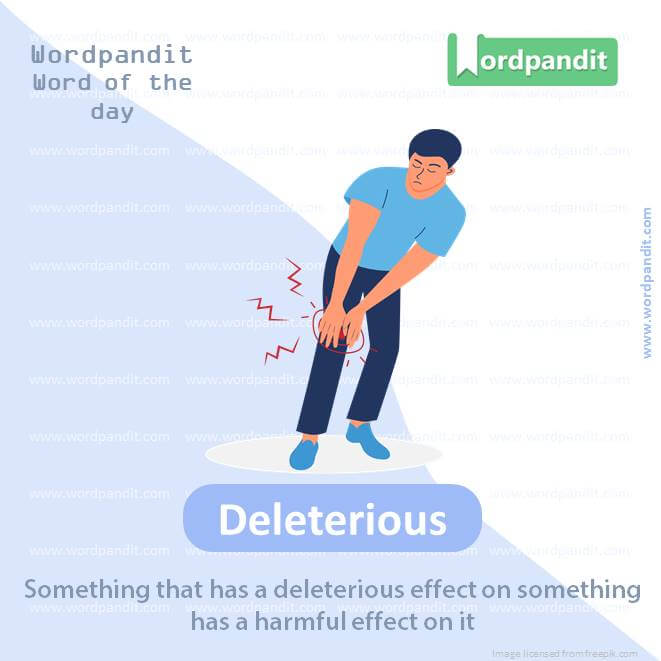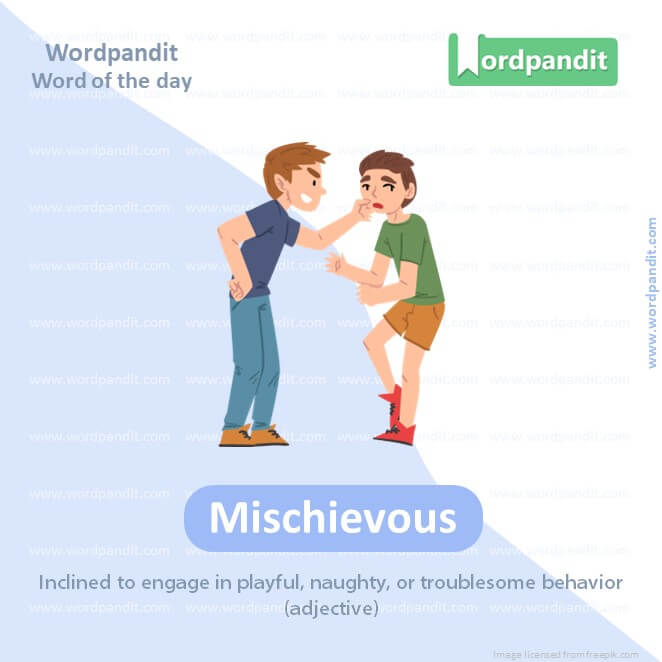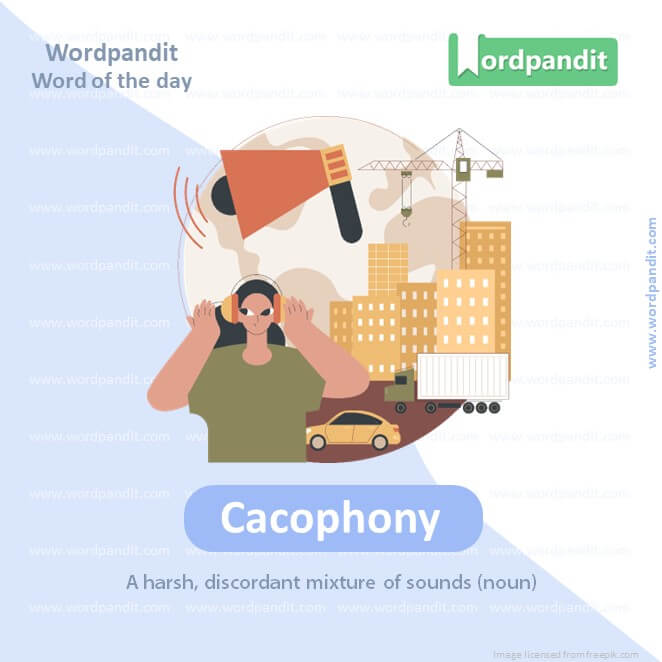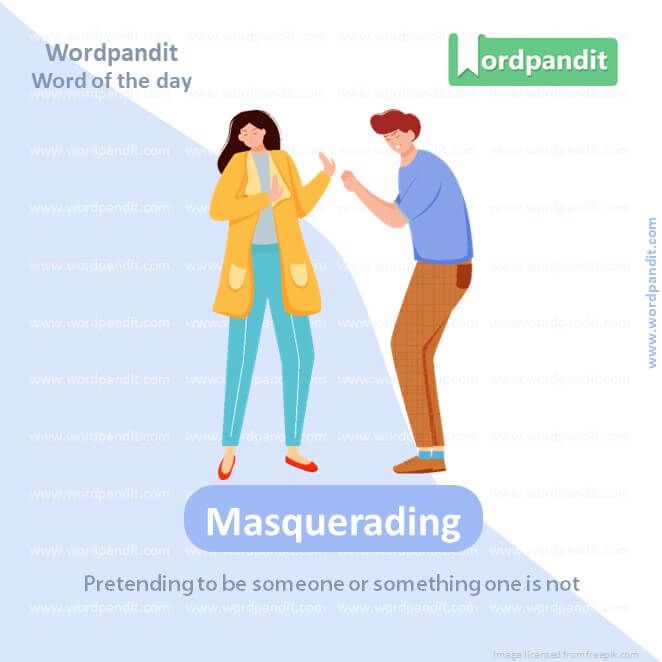Daily Vocabulary Words: List of Daily Used Words
Hi there. Welcome to this special section @ Wordpandit.
Our endeavour here is straightforward: highlighting important daily vocabulary words, you would encounter in The Hindu. This is your repository of commonly used words; essentially, we are posting a list of daily used words. Hence, this has significant practical application as it teaches you words that are commonly used in a leading publication such as The Hindu.
Visit the website daily to learn words from The Hindu.

WORD-1: Deleterious
CONTEXT: Apart from the deleterious effects of such a scenario on the domestic front (through higher fuel prices, for one), the trade balance and the rupee would be under pressure.
SOURCE: The Hindu
EXPLANATORY PARAGRAPH: Imagine eating too much candy every day. It might taste yummy, but it’s not good for your body. “Deleterious” means something is like that candy, it may seem nice or fun at first, but it can harm you in some way. It’s like a trickster pretending to be your friend but causing trouble instead.
MEANING: something that has a deleterious effect on something has a harmful effect on it.
PRONUNCIATION: dih-LEE-teer-ee-uhs
SYNONYMS: harmful, detrimental, damaging, injurious, adverse, unhealthy
USAGE EXAMPLES:
1. Smoking has deleterious effects on your lungs.
2. Too much sugar can have a deleterious impact on your health.
3. The company decided to remove the deleterious chemicals from its products.
4. Lack of exercise can lead to deleterious consequences for your body.

WORD-2: Reinvigorated
CONTEXT: Tackling concerns about product quality (in spices or drugs, for example) or allegations about labour or environmental concerns (aimed at booming shrimp exports) with greater vigour, is also critical. Moreover, agricultural exports, curbed in the battle against inflation, must be reinvigorated soon, given the healthy monsoon prospects.
SOURCE: The Hindu
EXPLANATORY PARAGRAPH: Have you ever felt tired after playing all day, but then you take a nap and feel super energetic again? That’s like being “reinvigorated.” It’s when something makes you feel fresh and full of energy again, like a superhero getting their powers back after a rest.
MEANING: Made a feel fresh or strong again.
PRONUNCIATION: ree-in-VIG-uh-rey-ted
SYNONYMS: revitalized, refreshed, rejuvenated, invigorated, renewed, energized
USAGE EXAMPLES:
1. After a good night’s sleep, she felt reinvigorated and ready to tackle the day.
2. The team was reinvigorated by their coach’s pep talk.
3. A walk in the fresh air can reinvigorate your mind.
4. The company’s new marketing campaign reinvigorated interest in their products.

WORD-3: Mischievous
CONTEXT: A mischievous and selective presentation of facts can sometimes be more dangerous for democracy than pure lies.
SOURCE: The Hindu
EXPLANATORY PARAGRAPH: Think of a mischievous elf hiding your toys just to see you search for them. “Mischievous” is when someone or something is playful in a naughty or tricky way, like a cheeky puppy stealing socks or a sneaky cat knocking over a vase.
MEANING: inclined to engage in playful, naughty, or troublesome behavior (adjective).
PRONUNCIATION: MIS-chuh-vuhs
SYNONYMS: naughty, playful, impish, roguish, rascally, prankish
USAGE EXAMPLES:
1. The mischievous children hid behind the door to scare their friend.
2. His mischievous grin gave away his plans for a prank.
3. The mischievous kitten knocked over the flowerpot.
4. Despite his mischievous antics, everyone found him endearing.
WORD-4: Scaremongering
CONTEXT: What leaders say during elections are largely kernels of truth that are puffed up so that they can claim superhuman qualities, or engage in scaremongering, or slander their opponents.
SOURCE: The Hindu
EXPLANATORY PARAGRAPH: Have you ever heard a spooky story that made you feel scared, even though it might not be true? That’s like what “scaremongering” does. It’s when someone tells scary stories or spreads rumors to make people afraid, even if there’s no real danger.
MEANING: The action of spreading frightening rumors or exaggerating possible dangers (noun).
PRONUNCIATION: SKAIR-mon-guhr-ing
SYNONYMS: fear-mongering, alarmism, panic-mongering, intimidation, scare tactics, propaganda
USAGE EXAMPLES:
1. The politician’s scaremongering about immigrants caused unnecessary panic.
2. The tabloid newspaper was accused of scaremongering with its sensationalist headlines.
3. Don’t listen to the scaremongering about the new virus; it’s important to get accurate information.
4. The company’s competitors engaged in scaremongering to damage its reputation.
WORD-5: Abstractions
CONTEXT: these statements are abstractions, such as someone is communal or good or bad for the country, there is nothing a journalist can do or perhaps needs to do, other than merely reporting it.
SOURCE: The Hindu
EXPLANATORY PARAGRAPH: Have you ever drawn a picture of a dragon using only your imagination? That’s like an “abstraction.” It’s when you think about something that you can’t see or touch, like love or friendship. Abstractions are like the colors of your feelings and ideas, making your imagination an amazing place.
MEANING: Ideas or concepts that are not concrete or tangible (noun).
PRONUNCIATION: ab-STRAK-shuhns
SYNONYMS: concepts, notions, theories, ideas, thoughts, imaginings
USAGE EXAMPLES:
1. The poem was full of beautiful abstractions about nature.
2. Artists often use abstractions to convey complex emotions.
3. Philosophy deals with many abstract concepts.
4. The book explored the abstractions of time and space.
WORD-6: Eternally
CONTEXT: In the pre-digital era, falsehoods and misinformation had a short, localised life. Now, technology enables falsehoods to travel across continents, and remain eternally alive.
SOURCE: The Hindu
EXPLANATORY PARAGRAPH: Think about the sky with no end, stretching on forever and ever. That’s how long “eternally” means. It’s like when you promise to be friends with someone forever; you mean you’ll be friends eternally, without ever stopping.
MEANING: Lasting or existing forever; without end (adverb).
PRONUNCIATION: ih-TUR-nuh-lee
SYNONYMS: forever, endlessly, perpetually, infinitely, always, ceaselessly
USAGE EXAMPLES:
1. Their love seemed to last eternally.
2. The stars in the sky shine eternally.
3. He vowed to remember her eternally.
4. The ancient ruins stood as a reminder of a civilization that had existed eternally.

WORD-7: Cacophony
CONTEXT: A case in point is the recent cacophony over Muslim population growth. A mischievous and selective presentation of facts can sometimes be more dangerous for democracy than pure lies because the claim of factual accuracy is also made along with it.
SOURCE: The Hindu
EXPLANATORY PARAGRAPH: Close your eyes and listen to all the different sounds around you – cars honking, birds chirping, people talking. When all these sounds mix together and create a jumbled, noisy mess, it’s like a “cacophony.” It’s when noise sounds like a big messy pile instead of a beautiful melody.
MEANING: A harsh, discordant mixture of sounds (noun).
PRONUNCIATION: kuh-KAH-fuh-nee
SYNONYMS: discord, clamor, uproar, racket, din, noise
USAGE EXAMPLES:
1. The cacophony of the city streets kept him awake at night.
2. The cacophony of the orchestra tuning their instruments filled the concert hall.
3. In the marketplace, the cacophony of vendors shouting and customers bargaining was overwhelming.
4. The room was filled with a cacophony of voices, making it difficult to concentrate.
WORD-8: Diametrically
CONTEXT: This also leads us to the point of numbers never lying. Diametrically opposite arguments about the economy proliferate, all of them using numbers, tables, and graphs.
SOURCE: The Hindu
EXPLANATORY PARAGRAPH: Imagine you and your best friend standing at opposite ends of a seesaw. If you both move in opposite directions, that’s like being “diametrically” opposed. It means you have completely different ideas or opinions, like wanting pizza when your friend wants ice cream.
MEANING: In complete opposition; completely different (adverb).
PRONUNCIATION: dahy-uh-ME-tri-kuh-lee
SYNONYMS: completely, entirely, totally, utterly, absolutely, radically
USAGE EXAMPLES:
1. Their views on politics were diametrically opposed.
2. The two teams had diametrically opposite strategies for winning the game.
3. She realized they were diametrically opposed on the issue of environmental conservation.
4. The two artists had diametrically different styles of painting.

WORD-9: Masquerading
CONTEXT: Counter propaganda masquerading as journalism is as dangerous to journalism as propaganda which, by definition, is not bound by facts.
SOURCE: The Hindu
EXPLANATORY PARAGRAPH: Have you ever dressed up as a superhero for Halloween and pretended to save the day? That’s like “masquerading.” It’s when you pretend to be someone or something you’re not, like a dog wearing a cat costume or a regular person pretending to be a famous movie star.
MEANING: Pretending to be someone or something one is not (verb).
PRONUNCIATION: mas-kuh-REY-ding
SYNONYMS: pretending, disguising, posing, feigning, impersonating, pretending
USAGE EXAMPLES:
1. The spy was masquerading as a tourist to gather information.
2. The thief was caught masquerading as a delivery person.
3. She felt like she was masquerading as a confident person at the party.
4. The con artist was masquerading as a financial advisor to scam people.
WORD-10: Unbiased
CONTEXT: To bring the best factual and unbiased picture to the audience, a journalist will have to use data, context, and background information in a skillful manner.
SOURCE: The Hindu
EXPLANATORY PARAGRAPH: Imagine you have two pieces of cake in front of you, one chocolate and one vanilla. If you don’t prefer either and can judge which is better fairly, that’s being “unbiased.” It means you don’t let your feelings or opinions influence your decision, like a referee making fair calls in a game.
MEANING: Not prejudiced or influenced by personal feelings or opinions; fair (adjective).
PRONUNCIATION: uhn-BAHY-uhsd
SYNONYMS: impartial, neutral, objective, even-handed, fair-minded, disinterested
USAGE EXAMPLES:
1. A good journalist should be unbiased in their reporting.
2. The judge was praised for being unbiased in her decision.
3. The committee sought an unbiased opinion on the matter.
4. The teacher graded the assignments in an unbiased manner.
Vocabulary new Words
In the exuberant realm of language learning, nothing holds more thrill than the discovery of ‘vocabulary new words’. These gems of knowledge bring with them a fresh perspective and a deeper understanding of language. However, learning ‘vocabulary new words’ requires a methodical and focused approach.
The act of learning ‘vocabulary new words’ is a delve into linguistic novelty, often involving exposure to unfamiliar structures and meanings. Transcending the traditional approach of mere memorization helps in truly cementing newly learnt words into long-term memory. Interaction with a broad spectrum of written and spoken material, including novels, films, podcasts, and digital resources, provides a rich context of ‘vocabulary new words’ and significantly aids in their comprehension.
It’s noteworthy that unpacking ‘vocabulary new words’ is a steady process rather than a rushed one. A planned approach with a specific number of words, learned and reviewed each day, proves beneficial in effective learning. Coupling this method with technologies such as flashcards or memory-enhancement software can optimize the retention of ‘vocabulary new words’.
Integrating mnemonic devices and visual imagery is another highly efficient tool when learning ‘vocabulary new words’. Assigning unique stories or visuals to new words can enhance recall, making unfamiliar vocabulary much more approachable.
Lastly, practicing ‘vocabulary new words’ within daily routine is crucial for grasping their usage. Whether it’s through active utilization in conversation or incorporating these words in written communicative situations, application reinforces understanding.
In summation, mastering ‘vocabulary new words’ is an enriching pursuit that expands our linguistic horizons. However, a balanced approach, combining diverse reading materials, pacing your learning, employing memory-boosting strategies, and daily practice greatly streamlines the task. Embark on this fascinating journey, and let the ‘vocabulary new words’ fill your linguistic canvas with a fresh palette of expressions.











